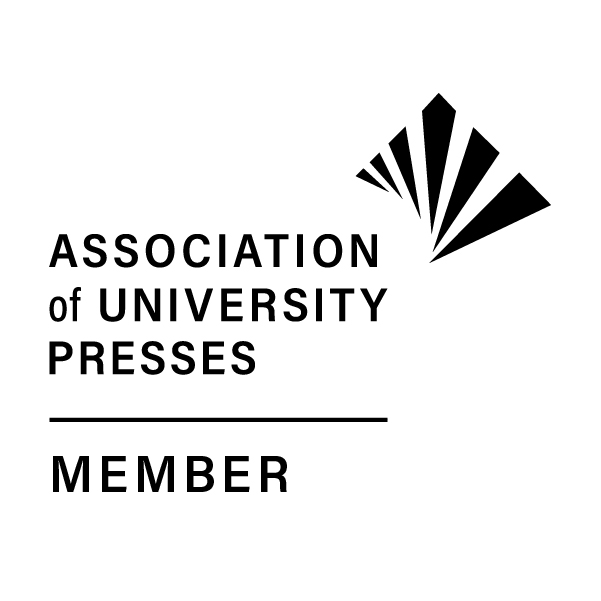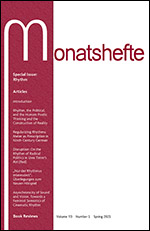|


|

Subscribe
Read the Journal Online
Submission Guidelines
Editorial Board
Receive Email Updates
Advertise in Monatshefte
Indexes/Abstracts
Current Issue TOC
Back Issues TOC
Monatshefte 2022 Subscription Rates
Institutions:
print & online $271
online only $233
Individuals:
print & online $103
online only $86
Non U.S. Postage (no postage charges for online-only subscriptions)
Airmail: add $40/yr.
Canadian Subscribers: add 5% GST. |
Monatshefte
Volume 110, Number 2, Summer 2018
Table of Contents
Special Issue: Archive und Geheimdienstakten: Dialogisches Erinnern an Verfolgung und Zensur im Ostblock
ARTICLES
Corina L. Petrescu, Alison Lewis, Valentina Glajar
Einleitung
Ulrike Garde
„Sie erzählen uns unsere Geschichte“. Theater of Real People als Plattform für die öffentliche Auseinandersetzung mit den Stasi-Akten
This article analyses Clemens Bechtel’s theatre productions Meine Akte und ich (My File and I, 2013) and Staats-Sicherheiten (State Securities, 2008). Both productions explore the so-called Stasi files, in which the GDR’s secret police service had gathered information on the lives of its fellow citizens. Instead of using professionally trained actors, Bechtel put some of the citizens who had been directly affected by the surveillance documented in the files on stage. These ‘real people performers’ presented to the audience their personal narratives, experiences, and perspectives of Germany’s recent past. The article analyses how this approach to narrating the past in theatre performances provides a platform for a fresh public engagement with diverse memories of the GDR. (UG; in German)
Valentina Glajar
„Cristina“ oder was in Herta Müllers Securitate-Akte steht. Über Löcher und Fehlschlüsse einer Aktengeschichte
In 2008, Herta Müller composed her reaction to reading her secret police surveillance file: Cristina und ihre Attrappe oder Was (nicht) in den Akten der Securitate steht. Müller focuses in particular on the gaps it features, the redacted parts, or the ones she believes were redacted, as further proof that the Romanian secret police has censured itself by erasing incriminating evidence. Her own reading of the file, as well as the title of her text, begs the question of what exactly is in her file. In this article, I engage with some of Müller’s claims in Cristina about the missing parts. As I will show, some aspects are just veiled and need to be uncovered, while others can be found in unexpected parts of the file. By reading and comparing information in both Müller’s and the novelist Richard Wagner’s files, a broader picture emerges, especially when including the wiretapped conversations, which allow their own voices to transpire, albeit in a mediated way. (VG; in German)
Anette Kind
Wer zensierte Adélias wollüstige Zigarette? Eça de Queirós und sein Romanwerk im Aufbau-Verlag
Regardless of its political couleur, every dictatorship seeks to control the literary scene in order to instrumentalize it for ideological purposes, to censor it, or to silence its voices of opposition. By recreating the background for the publication of Eça de Queirós’ novels by the GDR publishing house Aufbau this article investigates whether state-controlled censorship also interfered with literary translations or even with the concrete work of the translators. The archives of the Aufbau Publishing House, interviews with contemporary witnesses, the analysis of selected original texts as well as of their translations serve to answer the question whether the censors’ influence was limited to the state authorities’ interference in the preselection process of book titles by the publishing house, or if hidden censorship could also be detected at the linguistic level, i.e., in ideologically justified manipulations of literary expressions in the translations themselves. (AK; in German)
Alison Lewis
Dichtung und Wahrheit eines Stasi-Informanten in Annekatrin Hendels Dokumentarfilm Vaterlandsverräter (2012)
History and memory both have contributions to make to mastering the communist past, and yet, in relation to the GDR regime’s perpetrators—such as Stasi officers and informants—they cannot be considered equal partners. Documents from the Stasi archives (BStU) have generally been regarded as more reliable in ascertaining the truth about the past, while memory of collaborators, which often contains more fiction than fact, has been viewed with far more suspicion. Annekatrin Hendel’s documentary, Vaterlandsverräter (2012), about writer Paul Gratzik who was an informer for the Stasi, invokes the “evidentiary authority” (Baron) of the Stasi archive while also giving space to perpetrator memory. This article examines the role of the Stasi files as “testimonial objects” in eliciting a confession from Gratzik and how the confession is staged around the files’ “foundness.” The article argues that the authority of the archive is invoked not to elicit the truth about Gratzik but to probe the past and present in nuanced ways that promote reconciliation. The film can be seen as offering new, more inclusive approaches to perpetrator memory. (AL; in German)
Corina L. Petrescu
Rote Handschuhe: Eginald Schlattners Mea-culpa-Roman?
This article focuses on Eginald Schlattner’s novel Rote Handschuhe (2001). Upon its publication, the author claimed to have written it in an attempt to reconcile with former friends whose lives, similarly to his, had been dramatically altered by events taking place in the late 1950s in communist Romania—events which involved all of them and the Romanian secret police, Securitate. While through the writing of the novel Schlattner recognizes he was at fault in the unfolding of events, I claim that certain stylistic choices prevent his work from being a true mea culpa document. After a summary of the novel, my analysis centers on Schlattner’s style followed by a discussion of its reception in the German-language press in Europe. (CLP; in German)
REVIEW ARTICLE
Martin Kagel
Unruhestifter – Neuere Literatur zu Rolf Dieter Brinkmann
(Fauser, Markus, Hrsg., Medialität der Kunst. Rolf Dieter Brinkmann in der Moderne, 2011.—Fauser, Markus, und Martin Schierbaum, Hrsg., Unmittelbarkeit. Brinkmann, Born und die Gegenwartsliteratur, 2016.—Reißer, Johann, Archäologie und Sampling. Die Neuordnung der Lyrik bei Rolf Dieter Brinkmann, Thomas Kling und Barbara Köhler, 2016.—Bandeili, Angela, Ästhetische Erfahrung in der Literatur der 1970er Jahre. Zur Poetologie des Raumes bei Rolf Dieter Brinkmann, Alexander Kluge und Peter Handke, 2014.—Clare, Jennifer, Protexte. Interaktionen von literarischen Schreibprozessen und politischer Opposition um 1968, 2016.—Kobold, Oliver, „Lange nachdenkliche Gänge“. Rolf Dieter Brinkmanns Lyrik und Prosa 1959–1962, 2014.—Rümmele, Klaus, Zeichensprache. Text und Bild bei Rolf Dieter Brinkmann und Pop-Autoren der Gegenwart, 2011.)
BOOK REVIEWS
Allan, Seán and Sebastian Heiduschke, eds., Re-Imagining DEFA: East German Cinema in its National and Transnational Contexts (Elizabeth Mittman)
Banki, Luisa, Post-Katastrophische Poetik. Zu W.G. Sebald und Walter Benjamin (Dora Osborne)
Creech, Jennifer L., Mothers, Comrades, and Outcasts in East German Women’s Films (Faye Stewart)
Esleben, Joerg with Rolf Rohmer and David G. John, Fritz Bennewitz in India: Intercultural Theatre with Brecht and Shakespeare (S. Satish Kumar)
Früh, Judith, Tatort als Fernsehgeschichte. Historiografien und Archäografien eines Mediums (Friederike Eigler)
Gess, Nicola und Alexander Honold, Hrsg., Handbuch Literatur & Musik (Hannah V. Eldridge)
Hales, Barbara, Mihaela Petrescu, and Valerie Weinstein, eds., Continuity and Crisis in German Cinema, 1928–1936 (Jennifer M. Kapczynski)
Heinrich, Tobias, Leben lesen. Zur Theorie der Biographie um 1800 (Renata T. Fuchs)
Herrmann, Leonhard und Silke Horstkotte, Gegenwartsliteratur. Eine Einführung (Suzuko Knott)
Ingebrigtsen, Espen, Bisse ins Sacktuch. Zur mehrfachkodierten Intertextualität bei W.G. Sebald (Helen Finch)
Kuzniar, Alice A., The Birth of Homeopathy out of the Spirit of Romanticism (Jocelyn Holland)
Lennox, Sara, ed., Remapping Black Germany: New Perspectives on Afro-German History, Politics, and Culture (Vanessa D. Plumly)
McGlothlin, Erin and Jennifer M. Kapczynski, eds., Persistent Legacy: The Holocaust and German Studies (Elizabeth R. Baer)
Mildorf, Jarmila and Till Kinzel, eds., Audionarratology: Interfaces of Sound and Narrative (Rolf J. Goebel)
Neelsen, Sarah, Les essais d’Elfriede Jelinek. Genre, relation, singularité (Inge Arteel)
Pfabigan, Alfred, Mord zum Sonntag. Tatortphilosophie (Friederike Eigler)
Weatherby, Leif, Transplanting the Metaphysical Organ: German Romanticism between Leibniz and Marx (Christine Lehleiter)
Ziolkowski, Theodore, Music into Fiction: Composers Writing, Compositions Imitated (Rolf J. Goebel)
BOOKS RECEIVED
|

